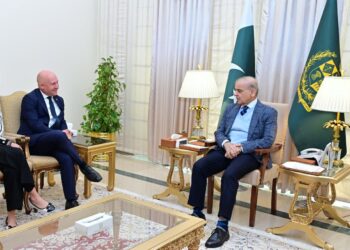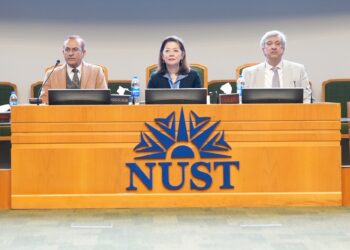Rawalpindi, Pakistan – Senior Pakistan Tehreek-e-Insaf (PTI) leader and Punjab organizer Alia Hamza Malik has raised serious concerns about the state of the judiciary and governance in Pakistan following the 26th Constitutional Amendment. Speaking to the media outside an Anti-Terrorism Court in Rawalpindi, she criticized the government for allegedly silencing the judiciary, suppressing political dissent, and worsening the economic plight of the public.
In a passionate and wide-ranging address to the media, Alia Hamza touched on a variety of issues including judicial dysfunction, inflation, youth unemployment, political victimization, and the deteriorating state of democracy in the country.
Judiciary on Leave Since 26th Amendment, Claims Alia Hamza
Alia Hamza claimed that the entire judicial system has been paralyzed since the 26th Amendment, stating, “You have sent the entire judiciary on leave.” According to her, judges are often absent, prosecutors are missing, and court hearings are consistently delayed or rescheduled. This, she says, has left ordinary citizens and PTI workers alike without access to justice.
She questioned how justice could be delivered in a system where “judges are on leave and prosecutors disappear”, suggesting that the current environment makes it impossible for fair trials to take place. Her statement indicates growing frustration within the PTI ranks regarding what they perceive as judicial overreach or judicial suppression under political influence.
Criticism of Politically Motivated Cases Against PTI
Alia Hamza also highlighted what she described as political victimization of PTI workers and leadership. “If we hold one protest, 7 FIRs are registered,” she said, citing a growing number of legal challenges against PTI members across the country. She described the current state of affairs as one where PTI leaders must appear in different courts in different cities almost every day, ranging from Rawalpindi to Sargodha.
This pattern, she argued, is part of a larger scheme to weaken PTI’s ability to organize, mobilize, and challenge the government through democratic means. “We are peaceful political workers, but they want to silence us using the courts,” she claimed.
Symbolic Journey of ‘Cherry Blossom’, ‘Ardali’ and ‘Laila’
In a cryptic but symbolic comment, Alia referred to the “journey of Cherry Blossom, Ardali and now Laila,” likely referencing government officials, court staff, or symbolic representations of power and its misuses. These metaphors were used to illustrate the government’s inconsistency and the spectacle of governance that distracts from real public issues.
She remarked that “if the rulers had come with the support of the people, they would not walk like lambs on a tightrope,” implying that the current government lacks legitimacy and is struggling to maintain control.
Economic Collapse: Inflation, Unemployment, and Budget Woes
Alia Hamza did not hold back in her critique of the government’s handling of the economy. She emphasized that the rising inflation has severely impacted Eid ul-Adha celebrations, with animal sacrifices decreasing by 30 percent compared to previous years due to high costs and financial hardship.
She pointed out that over 10.8 million Pakistani youth are unemployed, calling it a national crisis. “This government has punished the people through unbearable inflation and disastrous budget policies,” she asserted. “The budget has wreaked havoc on poor families, farmers, and the middle class.”
PTI’s Response: Taking the Mandate Back to the People
Alia Hamza announced that PTI will now take its fight for democracy directly to the people, especially targeting the rural and farming communities that have been disproportionately affected by economic mismanagement.
She revealed that Parliament-style gatherings would be held outside the Punjab Assembly where “Form 45 Assemblies” would be created—referring to a symbolic protest against what PTI alleges is electoral rigging and manipulation. According to Alia, “The people’s mandate has been stolen,” and the party will not rest until democracy is restored.
Reaffirming PTI’s Peaceful Political Identity
Refuting the allegations that PTI engages in violence or destructive protests, Alia reminded the media and authorities that “not a single pot was broken” during the party’s historic 126-day sit-in in Islamabad. She emphasized that PTI remains a peaceful political party committed to the Constitution and rule of law.
She added, “We want to show the world that we are fighting for the supremacy of the Constitution. This is not just a political struggle, but a moral one.”
Vow to Free the Judiciary and Restore Democracy
Alia Hamza made a strong commitment to what she called the “freedom of the judiciary.” She accused the current regime of holding the judiciary hostage through manipulation and pressure tactics. “We will also free the imprisoned judiciary and bring true democracy back,” she declared.
She further reminded the nation of the violence PTI faced on November 26, stating, “Bullets were fired at us. In Sambrial, they even shut off all the lights during our protest. Still, we ended our protest peacefully.”
These remarks were made in reference to PTI’s ongoing claims that state machinery is being used to suppress opposition voices and manipulate public discourse.
Latest Court Update: Bail Extended in Protest Cases
Earlier in the day, Alia Hamza appeared before Anti-Terrorism Court (ATC) Judge Amjad Ali Shah in Rawalpindi in connection with interim bail applications related to the November 26 protest cases. The court heard arguments and subsequently extended her interim bail until June 27.
The protest cases stem from a demonstration that allegedly turned controversial, but PTI continues to claim that it was peaceful and that the charges are fabricated for political purposes.
Background: The 26th Constitutional Amendment Controversy
The 26th Amendment to the Constitution of Pakistan, passed under controversial circumstances, has sparked debate about its impact on the judiciary and institutional independence. While official statements claim it was necessary for administrative improvements, critics—including opposition parties like PTI—believe it has weakened the judiciary’s autonomy and made courts more vulnerable to executive influence.
Legal experts, too, have expressed concerns about its implications, especially regarding the appointment, tenure, and oversight of judges, though the full scope of the amendment remains subject to judicial interpretation and political debate.
Conclusion: A Nation in Turmoil, a Party Determined
Alia Hamza’s statements reflect the deepening political and institutional crisis in Pakistan. As judicial independence, inflation, unemployment, and electoral legitimacy continue to dominate public discourse, PTI appears to be positioning itself as the flagbearer of constitutionalism and democratic accountability.
With her fiery rhetoric and continued court appearances, Alia Hamza has become one of PTI’s prominent voices rallying against what the party sees as systemic injustices. Whether or not these efforts yield results will depend on future court rulings, public mobilization, and international attention.

























